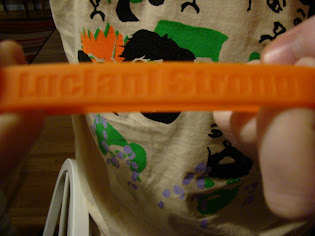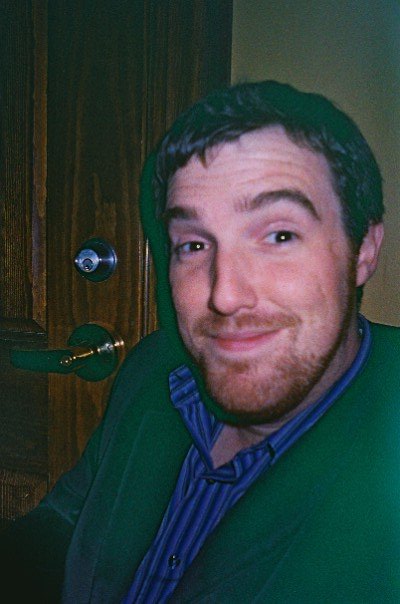If you're still here, hi. I'm still here, too. I've been getting back to normal things like going to work and walking around and being seen in public, which accounts for the radio silence on this blog. But I thought an update would be in order, so here goes:
Well, I have been out of the chemo for a few weeks now. In that time, I have had a couple of tests to gauge the effectiveness of my treatment. Let's run 'em down, shall we?
1) There was a CT scan to check on my lymph nodes. The size of your retroperitoneal lymph nodes after chemotherapy for TC is pretty crucial information, obviously. Nonseminomous testicular cancer (what I have) has a nasty habit of leaving behind a benign mass called teratoma. Teratoma is not itself dangerous but a) it can grow, putting pressure on your organs, and b) it can become cancerous later down the line, creating a recurrence of TC -- and cancer is always much more dangerous the second time around.
Before this CT scan, I had to drink one of those loathsome barium sulfate "smoothies" that coats your stomach a provides better image quality. Fortunately, I had been so fully briefed on how disgusting this stuff would be that the actual taste, while horrible, was miles better than I expected. (In fact, I think it's the mucus-y consistency as much as taste that really grosses people out.)
Anyhow, the scan revealed that my lymph nodes had shrunk significantly from the chemo, returning to their normal sizes. There is one node, however, that is still inflamed to about one centimeter. This poses a bit of a problem, as some oncologists would recommend surgery in my situation (in fact, would recommend it for any residual lymph node swelling whatsoever) while others would advocate surveillance. Dr. Hellerstedt is in the latter camp.
Post-chemotherapy RPLND surgery is a pretty intense and difficult procedure. Only a few surgeons in the country have done more than a handful of these procedures. Frequently, nothing more than scar tissue is found in the affected nodes. Nevertheless, the surgery does offer some peace of mind by (in all likelihood) revealing that there is definitely no active cancer in the nodes and removing any teratoma that is discovered.
On the other hand, it's certainly preferable not to get the surgery if you don't have to. And Dr. H seems confident that I don't have to right now. (The story will change if we see my one lymph node growing in a subsequent CT scan rather than shrinking back.)
I'm torn. I've done my homework, and I know that many TC specialists think the post-chemo RPLND should be done in any case of residual node inflammation for the the slight increase in statistical long-term survival that is possible. However, surgery carries risks, and these must be weighed against the slightly increased risk of recurrence that comes with not doing the surgery.
I hope I'm laying this stuff out clearly. It's pretty late as I write.
Given Dr. H's confidence, I am pretty comfortable in moving forward with surveillance for now. That'll be CT scans and blood tests every three months for the first year, with less frequent tests in subsequent years. If something happens during surveillance that makes us think surgery is necessary, then we will we move forward with that.
Just to put my mind at ease, though, I am going to ask Dr. H to put in a call with Dr. Lawrence Einhorn at Indiana University. Dr. Einhorn literally wrote the book on modern TC treatment and is famously helpful in answering calls to consult with oncologists around the world who are dealing with TC patients. If Dr. Einhorn concurs with our current plan, then I will move forward with surveillance and consider myself unreservedly in remission from testicular cancer. (Hoot, hoot.)
So! Keep your fingers crossed.
Oh yes. There was another test used to check out my lymph nodes.
2) A PET scan. (If you have any interest, click that link, because this scan actually works in a pretty interesting way that involves injection with radioactive material.) This was done to look for any "active cancer" in my inflamed lymph node -- cancer that the chemo just plain failed to kill. This scan is not really super useful for patients in my position; it is known to produce a significant number of false negatives, and it does not reveal the presence of teratoma. However, Dr. H thought we should go ahead with it because a) my insurance agreed to pay for it and b) if it was positive for activity in the node, we would definitely think about doing the surgery rather than surveillance. Fortunately, the scan was negative, as we expected.
OK. That is all for now, cats. I will continue to post as things develop ... and may even start posting about non-cancerous subjects as I return to normal life.
Thank you to everyone who has taken a moment to express concern and send good wishes. It was all very much appreciated, and I apologize to anyone who I failed to respond to individually. I am in much better energy now and have no excuses, so drop me another line if you like.
Wednesday, July 30, 2008
Subscribe to:
Posts (Atom)

